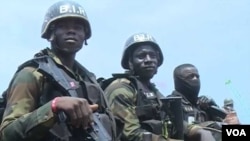Tens of thousands of people have deserted Cameroon’s conflict prone English-speaking regions after a bloody weekend. Fighting between the military and separatists left at least 40 people dead, and a prominent Catholic bishop was abducted. The renewed fighting comes after a military tribunal ordered separatist leaders imprisoned for life. The new violence has dashed hopes that schools would re-open this week, after being closed for three years.
Six hundred people wait at Amour Mezam, a bus terminal in Cameroon’s northwestern town of Bamenda, seeking rides to French-speaking towns. Like other bus companies in this area, the agency here has been overwhelmed with thousands of travelers leaving the English-speaking area over the past week.
Eunice Tanlaka, a 32-year-old, says bus station officials have promised she and her two children will be able to get on the next bus for Yaounde, the capital.
"I have been tired the whole day, the children have been tired, the fatigue is just too much," said Tanlaka. "Talk less of the transport fare that has been increased. It has not been easy on us, seriously."
Tanlaka said she is leaving Bamenda because separatist groups ordered businesses closed for at least two weeks, and attacked people who defied their instructions.
23-year-old Elizabeth Mbunwe says she left the English-speaking town of Ndop when a military attack against separatist fighters killed six civilians, including a baby.
"How can you be fighting for someone and then you kill them? The military says they are for the people but then again turn to kill them," said Mbunwe. "So, it is a whole confusing situation and we do not know who to walk to for help."
The government says at least 40 people were killed in renewed fighting between the military and separatist fighters in the English-speaking towns of Ndop, Bafut, Kumbo, Bamenda, Mamfe and Kumba.
At least eight people, including the Catholic bishop of the Kumbo diocese, George Nkuo, were kidnapped. The bishop was released when priests and hundreds of Catholics started marching to the bush areas where the separatists hide, demanding his freedom. The military says it is hunting for the other kidnapping victims.
Deben Tchoffo, governor of the English-speaking northwest region, says he has deployed troops to protect the population. He urged people not to flee and to assist the government in assuring their own security.
"Within our system of popular defense, I call on everybody, the population, traditional rulers, the administrative authorities, to revamp and remobilize the vigilante groups in the cities, the villages and the remote areas of the region," said Tchoffo. "We also need the contribution of the population to ease the task of the security forces"
The recent attacks began after a Yaoundé military tribunal said it had found separatist leader Julius Ayuk Tabe and his nine supporters guilty of secession, terrorism and hostility against the state. The tribunal handed down life prison sentences.
Separatists on social media ordered everyone in Cameroon’s English-speaking western regions to stay home to protest the sentences. They vow that schools will not open in the region until their leader is freed.
Violence erupted in the English-speaking regions in 2016 when teachers and lawyers protested alleged discrimination at the hands of the French-speaking majority.
The government responded with a crackdown that sparked an armed movement for an independent English-speaking state.






